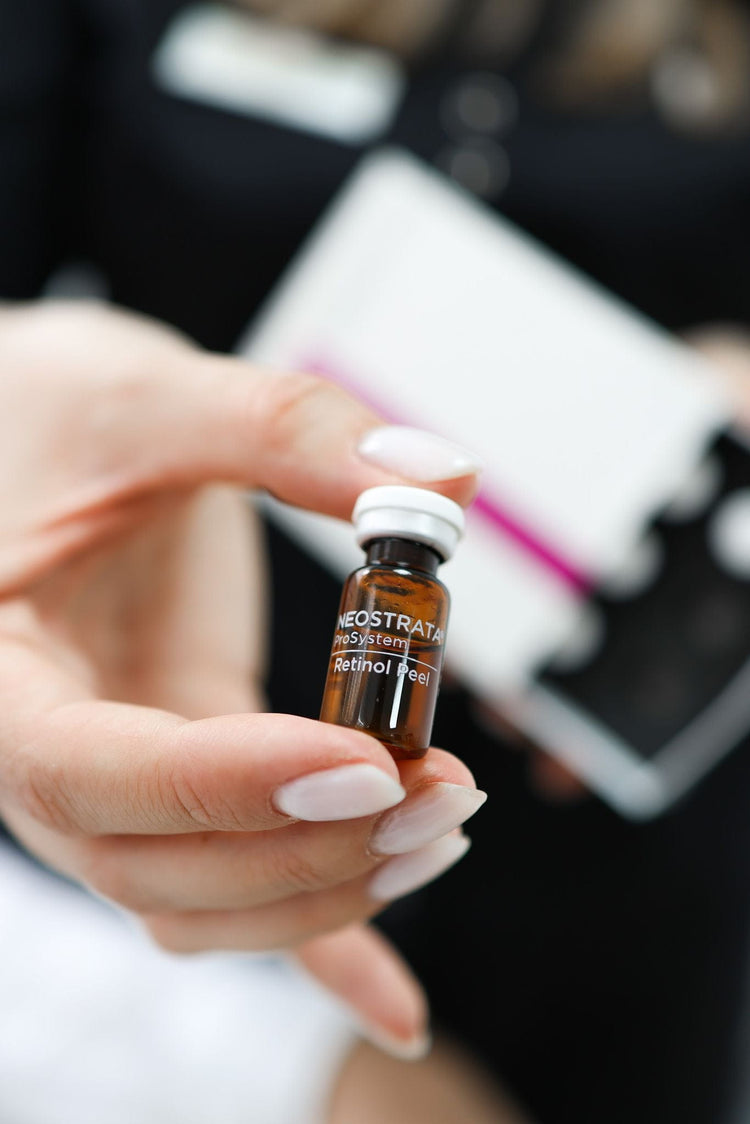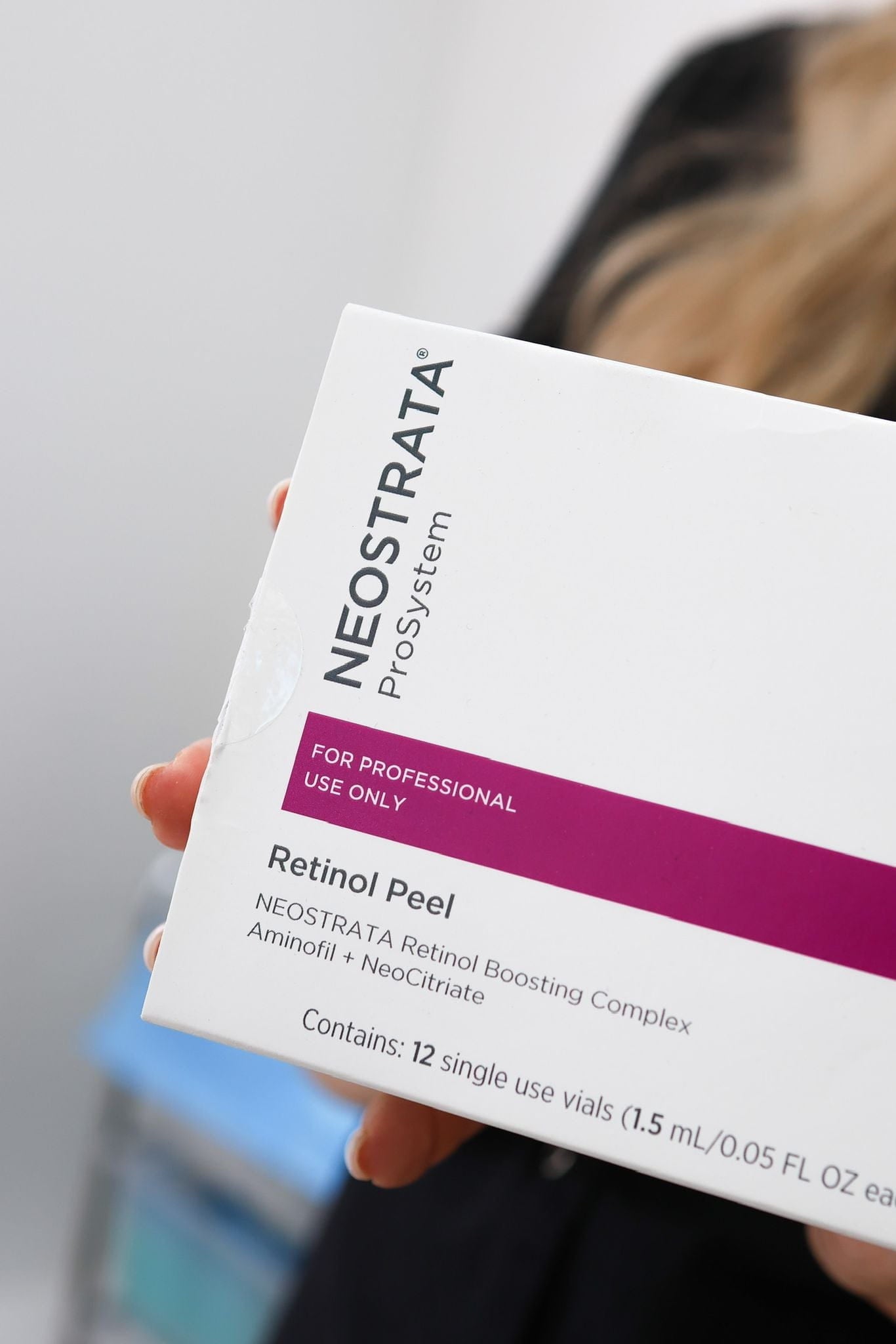Retinol Peel Benefits for Post-Acne Scars
Post-acne scarring can be a frustrating and persistent problem, leaving behind discolored marks and uneven skin texture. Fortunately, there are treatments available to help minimize these scars and restore smoother, more even skin. Retinol peels have emerged as a popular option for addressing post-acne scarring due to their ability to stimulate collagen production and improve skin cell turnover.
Mechanism of Action
Retinol peels offer a promising solution for minimizing the appearance of post-acne scars in Kingston Upon Thames. These peels utilize retinol, a derivative of Vitamin A, to penetrate the skin and initiate a series of beneficial changes. Retinol’s potent effects stem from its ability to stimulate collagen production, a crucial protein responsible for maintaining skin elasticity and firmness.
Here’s how retinol peels work to improve post-acne scarring:
- Exfoliation: Retinol promotes the shedding of dead skin cells, revealing smoother, brighter skin underneath. This exfoliation helps to diminish the appearance of pigmented scars by reducing surface discoloration.
- Collagen Synthesis: Retinol stimulates fibroblasts, the cells responsible for producing collagen. Increased collagen production strengthens and thickens the skin, gradually minimizing the depth and prominence of acne scars.
- Cell Turnover Acceleration: By accelerating cell turnover, retinol helps to even out skin tone and texture. This process reduces the appearance of unevenness caused by acne scarring.
Types of Retinol Peels Available
There are several types of retinol peels available, each with varying strengths and formulations. Superficial peels utilize low concentrations of retinol, suitable for mild post-acne scarring. Medium-depth peels incorporate higher concentrations of retinol and penetrate deeper into the skin, effectively addressing more moderate acne scars.
For more severe cases, deep peels containing potent retinol derivatives may be recommended. These peels require a longer recovery period but offer significant improvement in reducing deep acne scars and wrinkles.
Potential Side Effects and Risks
Retinol peels are a popular treatment option for post-acne scarring due to their ability to stimulate collagen production and improve skin cell turnover.

However, it is important to be aware of potential side effects and risks associated with retinol peels.
- Redness and Irritation: Retinol can cause temporary redness, flushing, and irritation after the peel.
- Peeling and Flaking: As the skin exfoliates, you may experience peeling and flaking for several days to a week following the treatment.
- Sun Sensitivity: Retinol can increase your skin’s sensitivity to the sun. It is crucial to wear sunscreen diligently and avoid direct sun exposure during the recovery period.
- Dryness:
Retinol can lead to dryness, so it is important to moisturize adequately.
In some cases, retinol peels may also trigger allergic reactions or worsen existing skin conditions like eczema or rosacea.
It is essential to consult with a qualified dermatologist or skincare professional before undergoing a retinol peel to determine if it is the right treatment option for your individual needs and skin type.
Finding a Qualified Provider in Kingston Upon Thames
Finding a qualified provider in Kingston Upon Thames who specializes in retinol peels is crucial for achieving optimal results and minimizing potential risks. A skilled practitioner will assess your skin condition, discuss your skincare goals, and recommend the most suitable type of peel based on the severity of your post-acne scarring.
Dermatologists Specializing in Scar Treatment
Retinol peels offer a promising solution for minimizing the appearance of post-acne scars in Kingston Upon Thames. These peels utilize retinol, a derivative of Vitamin A, to penetrate the skin and initiate a series of beneficial changes. Retinol’s potent effects stem from its ability to stimulate collagen production, a crucial protein responsible for maintaining skin elasticity and firmness.
- Exfoliation: Retinol promotes the shedding of dead skin cells, revealing smoother, brighter skin underneath. This exfoliation helps to diminish the appearance of pigmented scars by reducing surface discoloration.
- Collagen Synthesis: Retinol stimulates fibroblasts, the cells responsible for producing collagen. Increased collagen production strengthens and thickens the skin, gradually minimizing the depth and prominence of acne scars.
- Cell Turnover Acceleration: By accelerating cell turnover, retinol helps to even out skin tone and texture. This process reduces the appearance of unevenness caused by acne scarring.
There are several types of retinol peels available, each with varying strengths and formulations. Superficial peels utilize low concentrations of retinol, suitable for mild post-acne scarring. Medium-depth peels incorporate higher concentrations of retinol and penetrate deeper into the skin, effectively addressing more moderate acne scars.
For more severe cases, deep peels containing potent retinol derivatives may be recommended. These peels require a longer recovery period but offer significant improvement in reducing deep acne scars and wrinkles.
Retinol peels are a popular treatment option for post-acne scarring due to their ability to stimulate collagen production and improve skin cell turnover.
However, it is important to be aware of potential side effects and risks associated with retinol peels.
- Redness and Irritation: Retinol can cause temporary redness, flushing, and irritation after the peel.
- Peeling and Flaking: As the skin exfoliates, you may experience peeling and flaking for several days to a week following the treatment.
- Sun Sensitivity: Retinol can increase your skin’s sensitivity to the sun. It is crucial to wear sunscreen diligently and avoid direct sun exposure during the recovery period.
- Dryness:
Retinol can lead to dryness, so it is important to moisturize adequately.
In some cases, retinol peels may also trigger allergic reactions or worsen existing skin conditions like eczema or rosacea.
It is essential to consult with a qualified dermatologist or skincare professional before undergoing a retinol peel to determine if it is the right treatment option for your individual needs and skin type.
Finding a qualified provider in Kingston Upon Thames who specializes in retinol peels is crucial for achieving optimal results and minimizing potential risks. A skilled practitioner will assess your skin condition, discuss your skincare goals, and recommend the most suitable type of peel based on the severity of your post-acne scarring.
Clinics Offering Retinol Peel Services
For individuals seeking treatment for post-acne scarring in Kingston Upon Thames, several clinics offer retinol peel services. These clinics often feature experienced dermatologists or estheticians trained in administering various types of peels to address different skin concerns, including acne scars.
To find a suitable provider, consider researching online directories of skincare clinics in Kingston Upon Thames and checking their websites or social media pages for information about retinol peel services. Reading patient reviews can also provide valuable insights into the experience and expertise of different practitioners.
Consultation and Assessment Process
Retinol peels offer a promising solution for minimizing the appearance of post-acne scars in Kingston Upon Thames.
However, it is important to be aware of potential side effects and risks associated with retinol peels.
- Redness and Irritation: Retinol can cause temporary redness, flushing, and irritation after the peel.
- Peeling and Flaking: As the skin exfoliates, you may experience peeling and flaking for several days to a week following the treatment.
- Sun Sensitivity: Retinol can increase your skin’s sensitivity to the sun. It is crucial to wear sunscreen diligently and avoid direct sun exposure during the recovery period.
- Dryness:
Retinol can lead to dryness, so it is important to moisturize adequately.
In some cases, retinol peels may also trigger allergic reactions or worsen existing skin conditions like eczema or rosacea.
It is essential to consult with a qualified dermatologist or skincare professional before undergoing a retinol peel to determine if it is the right treatment option for your individual needs and skin type.

The consultation and assessment process typically involves:
- A thorough skin evaluation: The dermatologist will examine your skin, assess the severity of your post-acne scarring, and consider any underlying skin conditions.
- Discussion of medical history: You’ll be asked about your medical history, any medications you take, and previous skincare treatments.
- Review of expectations: Your dermatologist will explain what to expect during the peel procedure, recovery period, and potential outcomes. They will also discuss realistic expectations regarding scar improvement.
- Treatment plan: Based on your skin condition and goals, the dermatologist will recommend the most suitable type of retinol peel and create a personalized treatment plan.
Finding a qualified provider in Kingston Upon Thames who specializes in retinol peels is crucial for achieving optimal results and minimizing potential risks. A skilled practitioner will assess your skin condition, discuss your skincare goals, and recommend the most suitable type of peel based on the severity of your post-acne scarring.
For individuals seeking treatment for post-acne scarring in Kingston Upon Thames, several clinics offer retinol peel services. These clinics often feature experienced dermatologists or estheticians trained in administering various types of peels to address different skin concerns, including acne scars.
To find a suitable provider, consider researching online directories of skincare clinics in Kingston Upon Thames and checking their websites or social media pages for information about retinol peel services. Reading patient reviews can also provide valuable insights into the experience and expertise of different practitioners.
Preparing for and Aftercare for Retinol Peels
Preparing for a retinol peel involves understanding its potential effects and taking steps to minimize risks.
Before the treatment, it’s crucial to consult with a dermatologist or skincare professional who can assess your skin type and condition to determine the best course of action. Avoid sun exposure and discontinue using products containing retinol, vitamin C, or AHAs in the days leading up to the peel. On the day of the treatment, follow any pre-peel instructions provided by your practitioner, which may include cleansing your face thoroughly and avoiding makeup.
Aftercare is equally important for optimizing results and minimizing potential side effects. Apply a gentle moisturizer and sunscreen daily during the recovery period, as retinol can increase sun sensitivity. Avoid exfoliating or using harsh skincare products that might irritate your skin. If you experience any excessive redness, irritation, or other concerns, contact your practitioner for guidance. By following these guidelines carefully, you can enhance the effectiveness of your retinol peel and promote a smoother, more even complexion.
Pre-Treatment Skincare Routine
Preparing for a retinol peel involves understanding its potential effects and taking steps to minimize risks.
Before the treatment, it’s crucial to consult with a dermatologist or skincare professional who can assess your skin type and condition to determine the best course of action. Avoid sun exposure and discontinue using products containing retinol, vitamin C, or AHAs in the days leading up to the peel. On the day of the treatment, follow any pre-peel instructions provided by your practitioner, which may include cleansing your face thoroughly and avoiding makeup.
Aftercare is equally important for optimizing results and minimizing potential side effects. Apply a gentle moisturizer and sunscreen daily during the recovery period, as retinol can increase sun sensitivity. Avoid exfoliating or using harsh skincare products that might irritate your skin. If you experience any excessive redness, irritation, or other concerns, contact your practitioner for guidance. By following these guidelines carefully, you can enhance the effectiveness of your retinol peel and promote a smoother, more even complexion.
A good pre-treatment skincare routine should focus on preparing your skin for the peel and minimizing potential irritation. Here are some key steps:
-
Gentle Cleansing: Cleanse your face twice daily with a mild cleanser to remove dirt, oil, and makeup without stripping the skin of its natural moisture.
-
Exfoliation (1-2 times per week): Use a gentle chemical exfoliant containing AHAs or BHAs to help remove dead skin cells and improve product penetration. Avoid over-exfoliating, as this can make your skin more sensitive.
-
Hydration: Use a hydrating serum or moisturizer to keep your skin plump and hydrated. Look for ingredients like hyaluronic acid or glycerin which attract moisture.
-
Sun Protection: Wear sunscreen daily, even on cloudy days. Sunscreen protects your skin from UV damage, which can worsen post-acne scarring.
Post-Treatment Recovery Instructions
Preparing for a retinol peel involves understanding its potential effects and taking steps to minimize risks.
Before the treatment, it’s crucial to consult with a dermatologist or skincare professional who can assess your skin type and condition to determine the best course of action. Avoid sun exposure and discontinue using products containing retinol, vitamin C, or AHAs in the days leading up to the peel. On the day of the treatment, follow any pre-peel instructions provided by your practitioner, which may include cleansing your face thoroughly and avoiding makeup.
Aftercare is equally important for optimizing results and minimizing potential side effects. Apply a gentle moisturizer and sunscreen daily during the recovery period, as retinol can increase sun sensitivity. Avoid exfoliating or using harsh skincare products that might irritate your skin. If you experience any excessive redness, irritation, or other concerns, contact your practitioner for guidance. By following these guidelines carefully, you can enhance the effectiveness of your retinol peel and promote a smoother, more even complexion.
A good pre-treatment skincare routine should focus on preparing your skin for the peel and minimizing potential irritation. Here are some key steps:
-
Gentle Cleansing: Cleanse your face twice daily with a mild cleanser to remove dirt, oil, and makeup without stripping the skin of its natural moisture.
-
Exfoliation (1-2 times per week): Use a gentle chemical exfoliant containing AHAs or BHAs to help remove dead skin cells and improve product penetration. Avoid over-exfoliating, as this can make your skin more sensitive.
-
Hydration: Use a hydrating serum or moisturizer to keep your skin plump and hydrated. Look for ingredients like hyaluronic acid or glycerin which attract moisture.
-
Sun Protection: Wear sunscreen daily, even on cloudy days. Sunscreen protects your skin from UV damage, which can worsen post-acne scarring.
Expected Results and Timeline
Retinol peels have become a popular treatment for minimizing the appearance of post-acne scarring due to their ability to stimulate collagen production and enhance cell turnover. These peels utilize retinol, a derivative of Vitamin A, to penetrate the skin and initiate beneficial changes.
Here’s how retinol works to address post-acne scarring:
* **Exfoliation:** Retinol promotes the shedding of dead skin cells, revealing smoother, brighter skin underneath. This exfoliation helps to diminish the appearance of pigmented scars by reducing surface discoloration.
* **Collagen Synthesis:** Retinol stimulates fibroblasts, the cells responsible for producing collagen. Increased collagen production strengthens and thickens the skin, gradually minimizing the depth and prominence of acne scars.
* **Cell Turnover Acceleration:** By accelerating cell turnover, retinol helps to even out skin tone and texture. This process reduces the appearance of unevenness caused by acne scarring.
There are several types of retinol peels available, each with varying strengths:
* **Superficial Peels:** Utilize low concentrations of retinol, suitable for mild post-acne scarring.
* **Medium-Depth Peels:** Incorporate higher concentrations of retinol and penetrate deeper into the skin, effectively addressing more moderate acne scars.
* **Deep Peels:** Contain potent retinol derivatives and require a longer recovery period but offer significant improvement in reducing deep acne scars and wrinkles.
Before undergoing a retinol peel, it’s crucial to consult with a qualified dermatologist or skincare professional. They will assess your skin condition, discuss your goals, and recommend the most suitable type of peel based on the severity of your scarring. They will also advise you on pre-treatment steps and aftercare instructions.
Potential side effects associated with retinol peels include:
* **Redness and Irritation:** Temporary redness, flushing, and irritation are common after the peel.
* **Peeling and Flaking:** As the skin exfoliates, you may experience peeling and flaking for several days to a week following the treatment.
* **Sun Sensitivity:** Retinol can increase your skin’s sensitivity to the sun. It is crucial to wear sunscreen diligently and avoid direct sun exposure during the recovery period.
* **Dryness:** Retinol can lead to dryness, so it is important to moisturize adequately.
In some cases, retinol peels may also trigger allergic reactions or worsen existing skin conditions like eczema or rosacea.
To achieve optimal results and minimize potential risks, follow these aftercare tips:
* Apply a gentle moisturizer and sunscreen daily during the recovery period.
* Avoid exfoliating or using harsh skincare products that might irritate your skin.
* If you experience excessive redness, irritation, or other concerns, contact your practitioner for guidance.
If you are considering retinol peels to minimize post-acne scarring in Kingston Upon Thames, it’s important to consult with a reputable dermatologist or skincare professional. They can provide personalized advice and help you determine if this treatment is right for you. Remember, consistency with both pre-treatment and aftercare routines is crucial for achieving the best results and promoting a smoother, more even complexion.
Learn more about Retinol Peel options and benefits at It’s Me & You Clinic with Dr. Laura Geige.
- Bret Hart Quotes - September 16, 2025
- How To Find The Best Nasolabial Fold Fillers Clinic In Kingston Upon Thames - September 16, 2025
- Botox For Lip Lines In Virginia Water, Surrey - September 14, 2025
